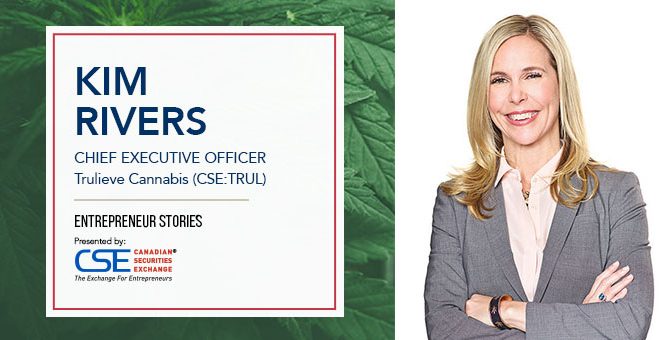Since launching in Florida’s medical cannabis market in 2015, Trulieve Cannabis (CSE:TRUL) has grown its operations to encompass a total of nine states across the U.S., expanding its team from 10 members to more than 6,000 and surpassing US$1 billion in revenue.
The company now operates the world’s largest retail network of cannabis dispensaries, not to mention more than 4 million square feet of domestic cultivation facilities, with 3 million square feet of that in Florida. Well-established hubs in the Northeast, Southeast and Southwest are anchored by leading market positions in Arizona, Florida and Pennsylvania.
Canadian Securities Exchange Magazine caught up with Trulieve Chief Executive Officer Kim Rivers in mid-May to discuss recent milestones achieved by the multi-state operator and upcoming catalysts in existing and new markets as regulatory initiatives at both the state and federal levels gain momentum.
Trulieve recently reported its first quarter financial results. Can you run through some of the highlights?
We had 4% revenue growth, both sequentially and year-over-year, to $298 million. We had a margin uptick from 54% in Q4 of 2023 to 58% and a significant increase in adjusted earnings before interest, taxes, depreciation and amortization (EBITDA) from 31% to 36%, with over $100 million in adjusted EBITDA.
We’re seeing the consumer strength and behaviour that we experienced at the end of Q4 continue into Q1. We’re the only one of our peers that has reported strong sequential growth. The initiatives that we’ve invested in for the last 12 to 18 months are beginning to show up in a real way in our financials.
You are Florida-based with the majority of your operations in that state. How would approval of the Smart & Safe Florida initiative on the November 2024 ballot benefit the company?
We were very excited to have the Supreme Court rule in favour of allowing Amendment 3 on the ballot, which would allow for adult, personal use of cannabis in the state of Florida. We have been a big supporter of the expansion of access to cannabis wherever we operate. With Florida being our backyard, it’s very close to home for us and we’re very passionate about it. This is the first time the issue will be before Florida voters.
Florida already is one of the best cannabis markets in the country with its medical market at close to 900,000 patients. If adult-use does pass, we anticipate that the market will grow to approximately $6 billion.
It’s important to build that adult-use program on top of existing infrastructure. We currently operate 135 medical locations in the state and have extensive cultivation and manufacturing capability in Florida as well. Florida is a vertical market so everything in our stores in the state comes from a plant that we grew. It’s true, strict seed-to-sale.
So, it’s a tremendous opportunity for us in the state of Florida and a tremendous opportunity for Floridians. I’m really looking forward to having the opportunity to vote on the initiative in November.
Your other cornerstone markets are Pennsylvania and Arizona. What opportunities do you see in those markets?
In Pennsylvania, we are very encouraged by the momentum that is happening right now in the legislature. Governor Josh Shapiro is very supportive of moving to adult-use and we’re seeing increased discourse and bipartisan support of passing a bill in the legislature to move that market to adult-use. We believe that Pennsylvania could be an approximately $4 billion market. Pennsylvania also has a very robust, healthy medical market. We have seen tremendous growth in our brands, particularly among Roll One and Modern Flower.
Trulieve is in Arizona through our acquisition of Harvest Health & Recreation. We are at the point now where we have opened some brand new locations under the Trulieve banner and are looking forward to transitioning 100% of our store locations this year from the Harvest name into the Trulieve platform.
We also just launched our revamped loyalty program. Arizona was our first large market for the launch and that has done tremendously well. We had an approximately 30% adoption rate in just two months and we’ve seen a 50% increase in return frequency from those customers who are opting into that loyalty program, an incredible start out of the gate. We are looking to roll that program out to all of our other markets this year.
We’re also really excited about Ohio moving to adult-use and us being positioned to take advantage of that opportunity. We are waiting for some additional clarity but it looks like it could be as soon as the summer for adult-use to turn on in that market.
There is a lot of positive momentum around policy reform in the U.S. with cannabis set to be rescheduled from a Schedule I to Schedule III drug and the SAFER Banking Act. How do you see this playing out?
Rescheduling will have huge implications, as it is the first significant policy change for cannabis to happen at the federal level. I believe that it’s the first important domino that could set off a series of additional policy changes.
It takes a long time in the U.S. to have policy shifts. I think folks forget that the average length of time for a policy to make it from an idea to final passage is approximately 11 years. With SAFER Banking, we’re at the 10- to 11-year time horizon right now. That certainly gives me additional optimism that we could pass SAFER Banking on the heels of an official rescheduling of cannabis to Schedule III.
The second thing is that it will open the door for additional research. I’m super excited about the possibility of having more clinical trials produce data we can lean into for our products and to make sure the public is as educated as they can be as it relates to the benefits and health concerns that this wonderful plant can help address.
One of the major benefits of rescheduling would be that cannabis operators will no longer be subject to tax code 280E. How would this impact your financial position?
For folks who don’t know, 280E is a penalty tax for businesses working with a Schedule I drug, under which cannabis is currently classified alongside methamphetamine and heroin. It does not allow you to make any normalized business deductions, so we have a massively increased tax burden. After rescheduling, we would become a normal payer, which would drastically reduce that liability. The great news here is that we won’t have to wait for another process to unfold. It’s automatic.
To put the impact in context, our 280E tax liability from 2021 to 2023 was $350 million. For the first quarter, our 280E exposure would have been approximately $46 million. It has a sizable, very material impact on our financials.
Those potential savings are significant. Are there any particular initiatives you would reallocate these funds to?
Optionality is critical in this business. There are a lot of things that happen externally that we look to influence but that are out of our control. We want to have optionality as it relates to our balance sheet position as well as flexibility for when opportunities do present themselves so we can act quickly on them ahead of growth cycles and catalysts.
What can investors expect from Trulieve for the remainder of 2024?
We have built this company to be profitable and durable and you’re seeing that in our numbers. The only way we are able to deliver those results is through the strength of our products and our relationships with our customers, so we continue to invest in our customer experience and our employees. Also, our fully automated 750,000 square foot indoor cultivation facility in Florida has turned on and is contributing to significantly lower costs, which show up in our margins and give us greater optionality and flexibility in terms of the customer experience we’re able to deliver.
This story was featured in Canadian Securities Exchange Magazine.
Learn more about Trulieve Cannabis at https://www.trulieve.com/.


